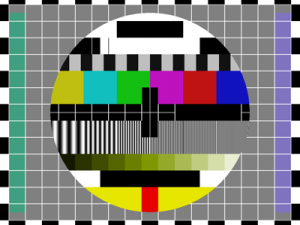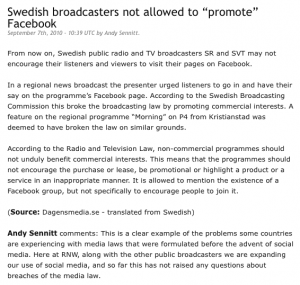Swedish broadcasters told not to “promote” Facebook
This is less a post and more a comment on a post elsewhere … I was commenting on this article last week and it is still in moderation and can only assume it won’t be approved. It would seem the author doesn’t want other points of view on this. It’s just as well I kept a copy and so I will comment here on it instead. But before I do, here is the comment policy on the site, Radio Netherlands Worldwide (Media Network blog), where I spotted it.
Please keep your comments on topic, which means they must have something to do with the subject of the post. Comments must be in English, not your native language. If I cannot understand a comment, for legal reasons I will have to delete it. Don’t worry if your English is not pefect; I will correct any spelling mistakes etc.
Yes it does say “not pefect”. I don’t mean to be pedantic about that (you’ll find plenty of typos here I’m sure and perhaps it is meant to be a joke) but as it seems to be the case that my comment was not ‘understood’, I will post it here instead and see if anybody understands it. There is only one comment on the article, plus one in subtext from the author / translator Andy Sennit, so it seems like it is a given that this is the wrong decision and that some broadcasters are behind the times and that nobody thinks any different. The translated article is captured below and I have located the original article in Swedish on Dagensmedia here.
[click to enlarge]
My comment: (expanded a bit)
To me this is a sign that broadcasters need to integrate their own social media strategies rather than just jump on the latest bandwagon (i.e. visit us on Facebook, Twitter et al..). The whole landscape could easily change within a couple of years and all this input into proprietary platforms will be wasted… (as it is, Facebook is largely a closed system). Besides, all these things can be easily ‘plugged-in’ to your own website as a means to make communication and feedback easier for the audience (e.g. Facebook Connect). Let them choose how they wish communicate once they reach your site. Facebook is a commercial service and why should it get free advertising from a publicly funded broadcaster on air? Surely it makes more sense for a broadcaster to have an integrated feedback system which gives the audience a choice and also allows them to see everything in one place. The main Radio Netherlands Worldwide website is a good and comprehensive site in itself, yet it’s commenting system is archaic, in that it doesn’t allow any other ways of easily connecting (eg Open ID, Google etc). The way I read this, Mr. Sennit should perhaps bring his expertise in ‘social media’ to his bosses, and have them just redirect the whole RNW website to their Facebook page(s)!
Also it should not be taken for granted that ‘everyone’ who is online has a Facebook account…. There are plenty of reasons why people ‘choose’ not to (same applies for Twitter). So just because these are the current most popular platforms doesn’t mean they are the future of communications. It is up to businesses to adapt to new trends to suit their needs, but not to get swept away by them and most importantly to be easily accessible.
It may be the case that Twitter is a more open service but that may not be always so. The ads will come (soon) in some way or other in order to satisfy investors. Fair enough #hashtags offer a good way to filter tweets which relate directly to an audience conversing about a television programme, but the same kind of solution can be applied to other real time services. There is little need to promote Facebook / Twitter et al.. they do that by themselves.. (after all it boils down to an advertisement / endorsement.. and that raises questions). The direction many services are taking is using authentication from accounts to log into other services using oAuth for example. All a broadcaster needs to do is point people to their own website and then the viewer can choose whatever tools of communication they use to take part in the feedback loop.

The convergence is in some pain. We are experiencing technical difficulties. Please stand by.



